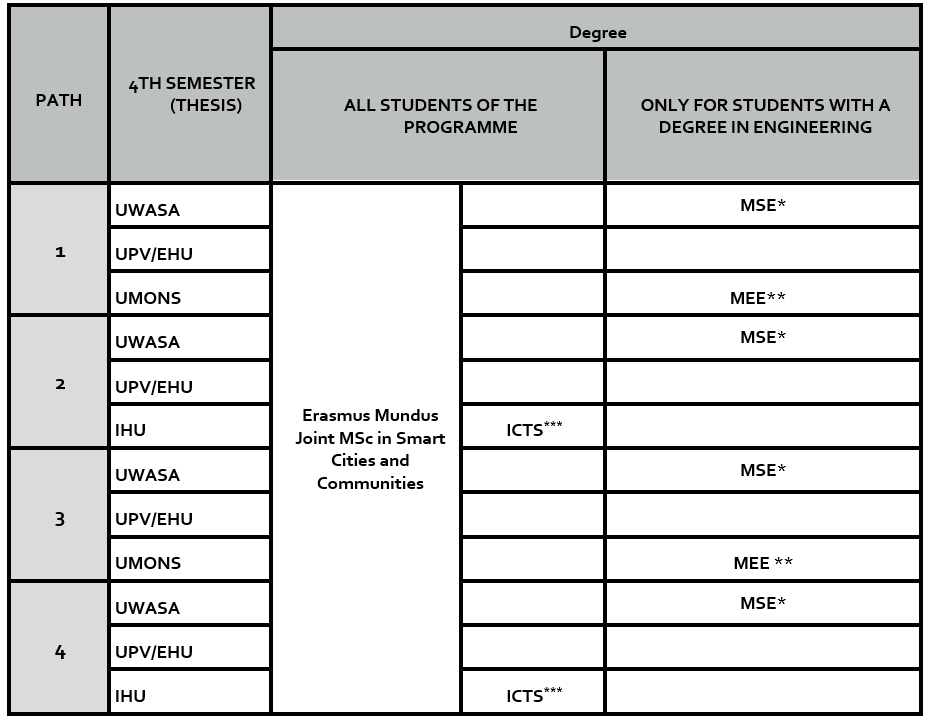Delivered DEGREES
Erasmus Mundus MSc in Smart Cities and Communities
All students are awarded the joint degree “Erasmus Mundus MSc in Smart Cities and Communities”, issued by UPV/EHU. UPV/EHU is physically signing the diploma parchment on behalf of all partners. The diplomas will bear the crests of all four institutions. The joint degree is awarded by UPV/EHU at its normal graduation ceremonies, and the degree parchments will bear the signature of the authorized signatories from UPV/EHU. The graduation fee will be in line with UPV/EHU’s policies and practices. This diploma is also accompanied by the official transcripts of records from all co-operating Institutions.
The students are also awarded a joint Diploma Supplement, issued by UPV/EHU and defined according to the Europass standards and guidelines, including specific information concerning the student learning path (mobility path, SMACCs specialization obtained, ranking, converted transcripts of records, internships, etc.).
Additional Degree Options
In addition to the MSc degree in Smart Cities and Communities, SMACCs students have additional degree options depending on their mobility paths and background (i.e., pre-SMACCs degree):
- Students who have chosen mobility path 1 or 3 (i.e. second semester at UMONS), have been admitted with a degree in engineering, and have chosen their Thesis under supervision of UMONS, are eligible to additionally obtain the official University degree of MSc in Energy Engineering with specialized focus in Energy Usage in Cities and Communities. A supplement stating the specialization obtained at UMONS in the area of Sustainable Urban Planning, Energy and Mobility will also be obtained. The UMONS MSc degrees have been awarded the EUR-ACE® European quality label for engineering degree programmes and are fully recognized in Europe. They give access to the professional accreditation processes in most countries (with all professional and legal rights).
- Students who choose mobility path 2 or 4 (with the second semester spent at IHU), perform their theses under supervision of IHU, may provisionally obtain the MSc in ICT Systems, provided that their BSc is recognized by the Greek NARIC (unless their BSc comes from a Greek State University, like IHU). A diploma supplement stating the further specialization obtained at IHU in the area of Information and Communication Technologies is also issued.
- Students who have chosen their thesis under supervision from UWASA, and have been admitted with a degree in engineering, are eligible to additionally obtain the MSc in Technology, Master’s Programme in Smart Energy/Diplomi-insinööri, Master’s Programme in Smart Energy -koulutusohjelma from UWasa. A diploma supplement stating the further specialization obtained at UWasa in the area of Smart Grid Solutions is also issued.
The overall degree possibilities are shown in the table below:

* MSE (MSc in Technology, Master’s Programme in Smart Energy) of UWASA
** MEE (MSc in Energy Engineering with specialized focus in Energy Usage in Cities and Communities) of UMONS
*** ICTS (MSc in Information and Communication Technology -ICT- Systems) of IHU

